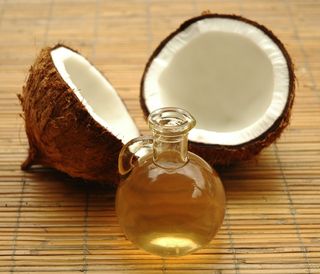What Is Coconut Oil?

The coconut palm ranks as one of the most useful plants on the planet. For generations, cultures in tropical regions have used it for food, cosmetics or building materials. Today, coconut oil is also sold as a nutritional supplement that has an impressive range of touted uses, from getting rid of lice to treating diabetes.
The species Cocos nucifera is thought to be native to the coasts of Southeast Asia and Melanesia. Scholars theorize the plant spread on ocean currents to India and East Africa. The Polynesians introduced various forms of the coconut to the Pacific Islands as they settled there 4,500 years ago. Coconut palms may live as long as 100 years, and grow to nearly 100 feet tall.
At least 12 crops can come out of a coconut plant, depending on its state of maturation. Nectar from unopened flowers can be used to create a syrup, which can be further processed into a sugar, or fermented into an alcoholic drink. The nut — technically called a drupe — holds coconut water when the coconut is unripe, but the water is absorbed as the fruit ripens from green to brown with a husk.
Coconut water has a considerable amount of nutrients, including potassium, sodium, magnesium and calcium, especially when compared with other juices. The coconut meat can be eaten or processed into oil and used in soaps, shampoos, toothpaste, in lubricants, paints, plastics or even burned in lamps. A 2011 review in the International Journal of Toxicology found coconut oil is reported as an ingredient in at least 626 cosmetics.
Cosmetics often tout coconut oil as a moisturizer. As a supplement, people use it topically to treat psoriasis and lice, or consume it for liver protection and to treat diarrhea, diabetes, high blood pressure and high cholesterol.
Does coconut oil work?
"Coconut oil has been used for a variety of indications; however, scientific evidence supporting its use for any condition is currently lacking," said Catherine Ulbricht, senior pharmacist at Massachusetts General Hospital in Boston and co-founder of Natural Standard Research Collaboration, which reviews evidence on herbs and supplements.
Very few high-quality studies have been done on coconut oil as a supplement. One 2009 study of 40 women compared the weight-loss effects of a coconut oil supplement with those of a soybean oil supplement over 12 weeks. Both groups of women in the study were instructed to follow a calorie-restricted diet, and walk 50 minutes a day, and both groups saw a drop in their body mass index. But the women who took coconut oil also saw a significant decline in their waist sizes, according to the paper in the journal Lipids. The women who took coconut oil also had healthier ratio of HDL (the so-called good cholesterol) to LDL cholesterol at the end of the trial.
Another preliminary study, this one conducted in rats, found coconut oil had some protective benefits for developing fetuses. Rats that are accosted with bright lights and physically restrained during pregnancy typically give birth to pups with low birth weight and slower development. However, rats in the study that were stressed but also fed supplements of coconut oil had pups that had better development of their motor skills than the offspring of stressed rats that weren't given the supplement, according to the paper published in the International Journal of Developmental Neuroscience.
For external use, Ulbricht said coconut oil appears to be as effective as mineral oil. But more research is needed before conclusions can be made. Overall, the Natural Standard Research Collaboration graded coconut oil as a "C," on a scale of A to F for evidence supporting claims for any health benefit.
Is coconut oil safe?
Coconut oil has a reputation for being a safe supplement. The U.S. Food and Drug Administration determined coconut oil to be safe in 1975, as it was then "used in paper and cotton packaging material for food at levels now current or as [it] might reasonably be expected to be used for such purposes in the future."
Ulbricht said she considers coconut oil generally safe when eaten or applied to the skin. However, there are a few exceptions. People who have cholera, dehydration or kidney problems should avoid coconut oil, she said. And people with high cholesterol should use it cautiously. Coconut oil is 90 percent saturated fat.
Coconut oil may cause low blood pressure, and Ulbricht urged caution for people taking it as a supplement alongside drugs, herbs or other supplements that lower blood pressure. Coconut oil may also interact with cholesterol-lowering agents, she said.
Sign up for the Live Science daily newsletter now
Get the world’s most fascinating discoveries delivered straight to your inbox.

